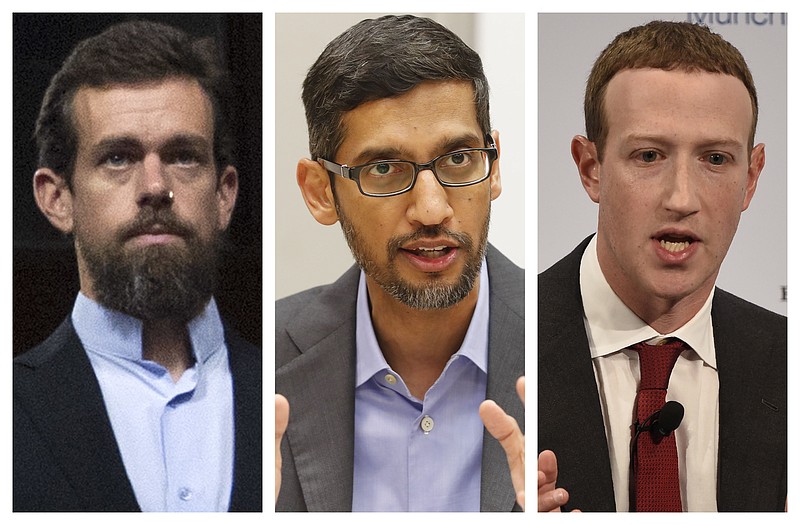WASHINGTON -- The CEOs of tech giants Facebook, Twitter and Google faced questioning Thursday in Congress as lawmakers asked about their companies' roles in fueling the January insurrection at the U.S. Capitol and rising covid-19 vaccine misinformation.
In a hearing by the House Energy and Commerce Committee, lawmakers pounded Facebook chief executive Mark Zuckerberg; Sundar Pichai, the CEO of Google, which owns YouTube; and Twitter chief Jack Dorsey over their content policies, use of consumers' data and children's media use.
Republicans raised long-running conservative grievances that the platforms are biased against conservative viewpoints and censor material based on political or religious viewpoints.
There is increasing support in Congress for legislation to rein in tech companies.
"The time for self-regulation is over. It's time we legislate to hold you accountable," said Rep. Frank Pallone, D-N.J., the committee's chairman.
That legislative momentum, plus the social environment of political polarization, hate speech and violence against minority groups, was reflected in panel members' impatience as they questioned the three executives. Several lawmakers demanded yes-or-no answers and repeatedly cut the executives off.
[Video not showing up above? Click here to watch » https://www.youtube.com/watch?v=-H_GyYUqKuQ]
"We always feel some sense of responsibility," Pichai said. Zuckerberg used the word "nuanced" several times to insist that the issues can't be boiled down. "Any system can make mistakes" in moderating harmful material, he said.
In a round of questioning, lawmakers called out the CEOs for creating platforms that enabled the spread of damaging misinformation about the presidential election and covid-19 vaccines in pursuit of profit and higher stock prices.
Lawmakers also blamed the companies' services for poisoning the minds of children and inciting the deadly insurrection at the Capitol, as well as contributing to the recent shootings in Atlanta and Boulder, Colo.
The three CEOs staunchly defended their companies' efforts to weed out the increasingly toxic content posted and circulated on services used by billions of people, while noting their efforts to balance freedom of speech.
"I don't think we should be the arbiters of truth and I don't think the government should be either," Dorsey said.
Democrats are laying responsibility on the social media platforms for disseminating false information on the election and the "Stop the Steal" voting fraud claims fueled by former President Donald Trump, which led to the deadly attack on the Capitol. Rep. Mike Doyle, D-Pa., told the CEOs that the riot "started and was nourished on your platforms."
Support is building for Congress to impose curbs on legal protections regarding speech posted on their platforms. Both Republicans and Democrats -- including President Joe Biden as a candidate -- have called for stripping away some of the protections under Section 230 of a 25-year-old telecommunications law that shields internet companies from liability for what users post.
The tech CEOs defended the legal shield under Section 230, saying it has helped make the internet the forum of free expression that it is today. Zuckerberg, however, again urged the lawmakers to update that law to ensure it's working as intended. He added a specific suggestion: Congress could require internet platforms to gain legal protection only by proving that their systems for identifying illegal content are up to snuff.
Facebook in January banned Trump indefinitely a day after rioters egged on by Trump swarmed the Capitol. Twitter soon followed, permanently disabling Trump's account.
Facebook hasn't yet decided whether it will banish the former president permanently. The company punted that decision to its quasi-independent Oversight Board, which is expected to rule on the matter next month.
Researchers say there's no evidence that the social media giants are biased against conservative news, posts or other material, or that they favor one side of political debate over another.
Democrats, meanwhile, are largely focused on hate speech and incitement that can spawn violence. An outside report issued this week found that Facebook allowed groups -- many tied to QAnon and militia movements -- to extol violence during the 2020 election and in the weeks leading up to the deadly riot at the Capitol.
Information for this article was contributed by Michael Liedtke of The Associated Press.
